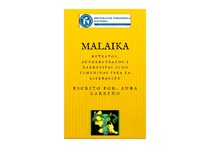Malaika : retratos, autorretratos y narrativas afro femeninas para la liberación.

Ver/
Citación
Fecha
2022Autor
Carreño Caicedo, Aura J
Director / Asesor / Tutor
Ospina Florido, Paola Andrea
Palabras claves
África
Mujer femenino
Diáspora afrocolombiana
Libertad liberación
Investigación creación formación
Colonización neocolonización
Decolonialidad
Árbol
Espiral
Keyword
AfrikaWoman feminine
Afro colombian diaspora
Research creation formation
Colonization neocolonization
Freedom liberation
Decoloniality
Tree
Spiral
Metadatos
Mostrar el registro completo del ítemResumen
Malaika: Retratos, Autorretratos y Narrativas Afro Femeninas para la Liberación, es una Invstigación-Creación que configura la indagación que parte del reconocimiento sensible del dolor punzante de una herida histórica: la opresión y violencias ejercidas sobre el pueblo africano en condición de diáspora en Colombia. Este proceso es llevado a cabo a partir de la relación en espiral propuesto por la Investigación-Creación/Formación que conecta el trabajo de la artista, investigadora y docente su cuerpo de mujer afro, en condición de diáspora en latitud de sur. Compuesto a su vez por una metodologia arbórea divida en tres partes: 1) La Raíz, representa la indagación histórica acerca de África, el secuestro y la esclavización y junto con ello los procesos de liberación 2) El Tronco, contiene el detonante creativo generado por este primer momento exponiendo la neocolonización como ml cultural y el trabajo epistolar como herramienta combativa creativa a esta problemática 3) Las Ramas, que configura la transposición didáctica de La Raíz y Las Ramas en un escenario comunitario en el barrio Caracolí en la localidad de Ciudad Bolivar (Bogota D.C).
Abstract
Malaika: Portraits, Self-Portraits and Afro Feminine Narratives for Liberation, is a Research-Creation that form a inquiry that start of the sensitive recognition of a stabbing pain of a historic hurt: the oppression and violences over the African diaspora community in Colombia. This process was do it from the spiral relationship that has been proposed by the Research-Creation/Formation and that connect the work between the artist, the researcher, the teacher and in this case her body of afro woman, in condition of diaspora in latitude of south. The methodology also content the tree form that is divide in three parts: 1) The Root, representing the inquiry about Afrika, the kidnap and slavery and finally the liberation proceses 2) The Trunk, this content the creative action that was create like detonating of The Root exposing the neocolonization like a cultural evil and the epistolary game like creative and combative tool to that problem 3) The Branches, form the didactic transposition of The Root and The Log in the community setting in the neighbourhood Cracolí in Ciudad Bolivar (Bogotá D.C).
Editorial
Universidad Pedagógica Nacional
Programa académico
Licenciatura en Artes Escénicas
